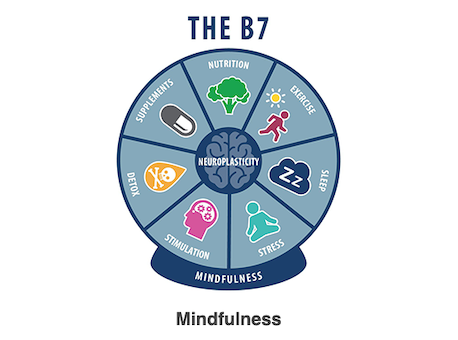June 21, 2022
Mindfulness

By Valerie Driscoll, Lead Coach and Coaching Program Developer for Apollo Health
Were it up to me; mindfulness would undergo a major rebranding campaign, like Cher did in the 70s. It would hire a PR firm and a stylist, change its name to something more “science-y”, and wear a studious pair of glasses.
This idea is a purely selfish wish, for, with a rebrand, I might spend less time convincing clients and students that consistently spending just 12 minutes a day cultivating awareness and attention through a mindfulness practice could be a little — or a lot — life-changing. The fact that there are mindfulness centers at major universities all over the planet (my credentials, in fact, come from Jefferson University and UC San Diego) does not seem proof enough to overcome a moniker that sounds so “woo-woo.”
Looking at the B7 lifestyle constellation, you will notice that it firmly rests on a base of mindfulness. The Apollo Health team spends much time and energy brilliantly explaining the “what to do” and “why to do” aspects of the protocol, yet so many participants struggle with the “how to do.” This is why coaches are an important part of a successful team when practicing the protocol — they know exactly how to do the how. For my money, there is no better way to nail the how than to practice mindfulness.
Mindfulness does many things, but most relevant to the Bredesen Protocol®, it trains us to be really great choosers. Mindfulness is most often associated with stress reduction, and creating choice is why; if you were able to effortlessly make all the choices you wanted to make in a day: eat only healthy food, exercise, go to bed at a consistent time, ignore the neighbor’s barking dog, not say a negative comment that pops into your head, or pay more attention to a present beautiful moment rather than a troublesome past or future one, how much less stressful might your life become?
Mindfulness can train your brain to do this.
In one of our earliest group coaching programs, the benefits to participants of learning mindfulness was their most consistent feedback.
So, let’s focus on four key ways in which mindfulness practice can make you a stellar chooser:
1. Mindfulness trains us to be observers of our thoughts rather than being caught up in them.
Author Tim Ferris likened his pre-mindful brain to being stuck in a front-loading washer with the “dirty laundry” of his thoughts, tumbled around and unable to get any footing or perspective; mindfulness training now allows him to get out of the washer, shut the door, look in and assess. His “thought laundry” is still there, but he is able to choose to relate to it differently. As mindful observers of a situation, we can choose which thoughts are beneficial to pay attention to in this moment and which are not.
2. Mindfulness teaches us to be responsive rather than reactive.
The practice literally rewires the brain to take time when we are triggered; in that space, we can choose a response rather than a reaction. Training the brain to create this mental space gives us the ability to create thoughtful action, and who among us does not need a little more of that?
3. Mindfulness allows us to sit with discomfort without acting on it.
Meditation gets a bad reputation for producing physical discomfort, but it is the mental discomfort that will really get you! “I don’t have time for this; I have too much to do!” When you practice choosing, on purpose, to notice this discomfort and sit through it anyway, you are training your mind to recognize the discomfort of old habits that want to be acted upon, acknowledge them, and purposefully choose a new behavior.
4. Mindfulness cultivates curiosity rather than judgment.
Our brains are wired for judgment. It was a requirement for survival (and still is), yet it does not always serve us well. Mindfulness teaches us equanimity: our thoughts are neither good nor bad, just thoughts. Without judgment, we can be curious: “How has this way of thinking served me in the past, and what are the other options?” Being curious in this way creates a mindset of growth and exploration.
So now that you have had a quick theoretical review how might cultivating the skill of mindfulness show up in real life?
A server places a basket of warm bread on the table.
You immediately notice the feeling of wanting the bread and thoughts about the bread. “I love bread; this is terrible!” But now, you are trained to be okay with this discomfort; you recognize old familiar thought patterns. They are neither good nor bad, nor are you good or bad for having them. Instead, they are just the usual dirty laundry. You can step back from them and perhaps become curious as to how you might be able to respond to this discomfort in a new way. In this space you are creating, you remember why you want to stay in ketosis for your brain health, how much it matters, and that it is only bread.
The bread stays in the basket.
Is this process always perfect? Nope, which is why we call it a practice. But I promise you this is a game-changer, and the more we do it, the more neural pathways are created to support this new way of being, and the process becomes automatic.
If you want to learn more about mindfulness and try a short meditation practice, you can click here.




